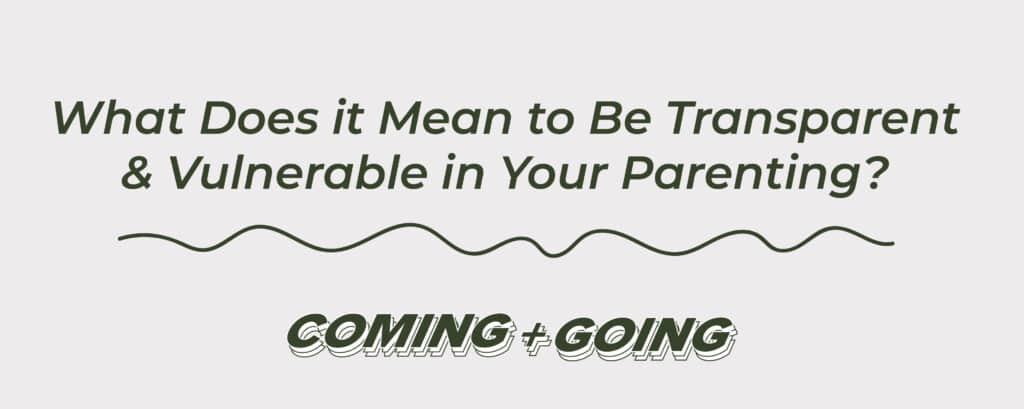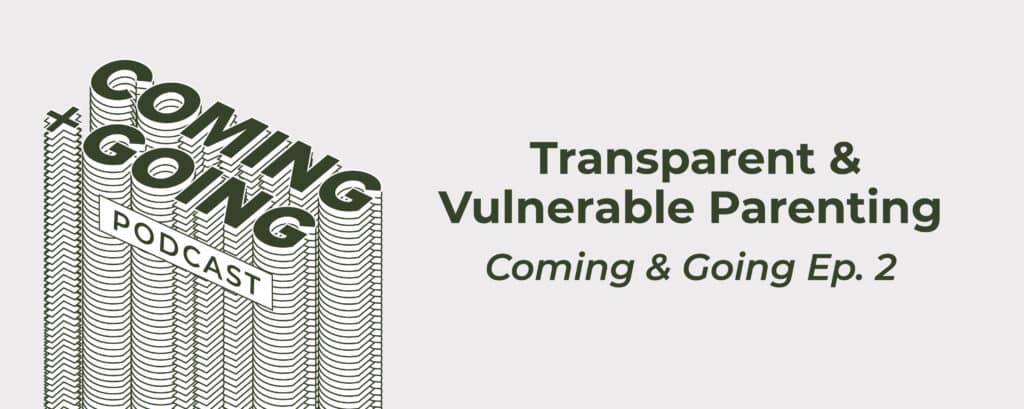Hope 365 Concert feat. TAYA & Hulvey - July 19 @ 7pm
How to Parent Transparently: A Coming & Going Blog
February 27, 2023
What does it mean to parent your kids in a transparent and vulnerable way? In a statement, it means that we are transparent and vulnerable with our kids about our sanctification process when we are at our best and when we are at our worse—the good and the bad.
Now, this isn’t easy by any means. It’s incredibly challenging and requires leaning on the Holy Spirit’s guidance to know when and what is appropriate to share for the life stage of your child or children.

I’ve been a parent for almost fifteen years. And in that time, I’ve found that parents, like myself, struggle to be transparent and vulnerable about their own sanctification process. Through reflection and conversations with others, I found two main reasons I believe vulnerability and transparency in our parenting are so difficult.
1️⃣ Our authority. We think that if we let our kids in behind the curtain, they will discover that we aren’t perfect and won’t respect our authority as a parent. We have this false reality that to have our kids look up to us; we have to seem perfect. But that’s not reality. The truth is that YOUR KIDS ALREADY KNOW YOU AREN’T PERFECT. They see you at your best and your worst. They see the parts of your life that most never get to see.
One of the greatest things I’ve had to learn in parenting is saying, “I’m sorry,” and admitting I’m wrong as a parent. In my parenting journey, I’ve often had to sit my kids down and say, “I was wrong. I’m not perfect, and sorry for what I said or did.” And I’ve learned that when we are humble, vulnerable, and transparent in our parenting, we don’t lose respect and authority from our kids—we gain it. Additionally, we are modeling for them what it looks like to live in the same manner. As you may have heard before, “more is caught than taught” when it comes to being a parent.
2️⃣ Timing. We sometimes don’t know when it’s appropriate to share certain parts of our story with our kids—if ever. We all have a story and a past. We all have a testimony. And it’s called a testimony because it’s a testament to how God has changed our lives, which means there are parts of it that aren’t always positive.
So, when do you share those parts of our story? I think this takes prayer and asking for the guidance of the Holy Spirit to know when is the right time. For example, my wife and I are entering the High School years with our oldest daughter, and we feel that we can begin to be more open about our past and present struggles during this season. The challenging part is that we can’t set dates for these conversations. Instead, we have to be proactive and involved parents leaning on the Lord for guidance and direction as to the appropriate time.

What are the wins or benefits of being transparent and vulnerable in our sanctification process?
▶️ It will breed more transparency and vulnerability in your children and family. Our kids are going to make mistakes, they are going to doubt their faith, and they are going to struggle to make the right choices. And when they do, they will be much more open to having conversations with us, knowing that we aren’t perfect and have had some of the same struggles. When we have instilled in them a culture of transparency and vulnerability, it only shows them that it’s ok not to be ok and that we all desperately need the grace of God—mom and dad included.
▶️ It shows who God is and His goodness. When we are open enough to tell our kids about our failures in life and what God has done in the process, it paints a beautiful picture of God’s goodness and grace. When they make mistakes, they will know that God still loves them, He can still use them, and He still longs to be close to them because they have heard the good news of the gospel in your story as their parent. Many parents struggle to share the negative of their story, but you can’t have good news without bad news; you can’t have God’s grace if grace is never needed.
Joshua 4:19-24 says,
The people came up out of the Jordan on the tenth day of the first month, and they encamped at Gilgal on the east border of Jericho. And those twelve stones, which they took out of the Jordan, Joshua set up at Gilgal. And he said to the people of Israel, “When your children ask their fathers in times to come, ‘What do these stones mean?’ then you shall let your children know, ‘Israel passed over this Jordan on dry ground.’ For the Lord your God dried up the waters of the Jordan for you until you passed over, as the Lord your God did to the Red Sea, which he dried up for us until we passed over, so that all the peoples of the earth may know that the hand of the Lord is mighty, that you may fear the Lord your God forever.”
Parents, God has given you a story, like a pile of rocks next to the Jordan river so that you can speak of God’s faithfulness. Let me encourage you that story of God’s faithfulness isn’t just for the world. It’s for your kids as well.
So, I’ll leave you with this question: what does it look like to be transparent and vulnerable in your parenting?
